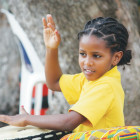
Nearly Half of U.S. States Enact Juvenile Justice Reforms
|
The public remains largely unaware that 95 percent of juveniles tried in adult courts nationwide are non-violent offenders.
Juvenile Justice Information Exchange (https://jjie.org/page/309/)

In late September, Torri was driving down the highway with her 11-year-old son Junior in the back seat when her phone started ringing.
It was the Hamilton County Sheriff’s deputy who worked at Junior’s middle school in Chattanooga, Tennessee. Deputy Arthur Richardson asked Torri where she was. She told him she was on the way to a family birthday dinner at LongHorn Steakhouse.
“He said, ‘Is Junior with you?’” Torri recalled.
Earlier that day, Junior had been accused by other students of making a threat against the school. When Torri had come to pick him up, she’d spoken with Richardson and with administrators, who’d told her he was allowed to return to class the next day. The principal had said she would carry out an investigation then. ProPublica and WPLN are using a nickname for Junior and not including Torri’s last name at the family’s request, to prevent him from being identifiable.
When Richardson called her in the car, Torri immediately felt uneasy. He didn’t say much before hanging up, and she thought about turning around to go home. But she kept driving. When they walked into the restaurant, Torri watched as Junior happily greeted his family.
Soon her phone rang again. It was the deputy. He said he was outside in the strip mall’s parking lot and needed to talk to Junior. Torri called Junior’s stepdad, Kevin Boyer, for extra support, putting him on speaker as she went outside to talk to Richardson. She left Junior with the family, wanting to protect her son for as long as she could ...

The public remains largely unaware that 95 percent of juveniles tried in adult courts nationwide are non-violent offenders.

Exploring why a shocking number of pacific islander youth end up in juvenile jail in Australia each year.

Christopher Street and the piers in the West Village in New York City still remain a refuge for gay and trans teens, even as their presence becomes more incongruous as the piers have been converted into a gentrified wonderland. On a recent evening, photographer Robert Stolarik visited and documented this safe haven.

A closer look at the report on the mental health services provided in the Illinois DJJ reveals several areas in need of improvement.

The Illinois DJJ and the ACLU have four months to review expert reports on the IDJJ’s psychological and mental health, educational, and safety and welfare services.

JJIE presents a series of stories from Australia examining that nation's approaches to juvenile justice.

Youth workers must learn that treating a parent with respect, rather than suspicion, ultimately benefits the child.

Cindy Mathers found herself at a loss. Tasked with engaging a group of young teenage boys identified as at-risk of transitioning poorly to secondary school, the community health nurse, who works with aboriginal communities in West Gippsland, Australia, was worried that conventional talk-based techniques would fall short with the boisterous boys. DRUMBEAT, a group program that uses hand drumming to create a fun, safe space for social learning and self-reflection, provided her with a solution.